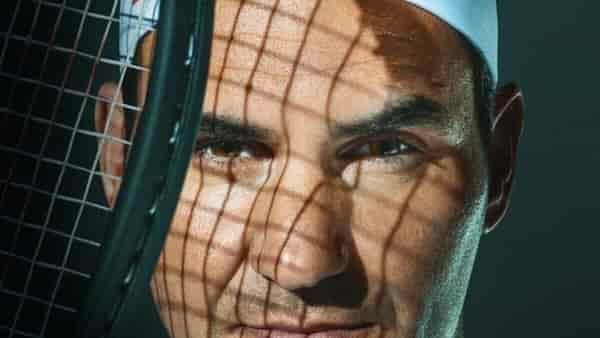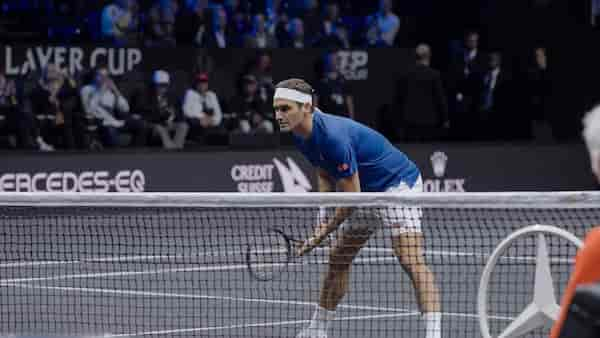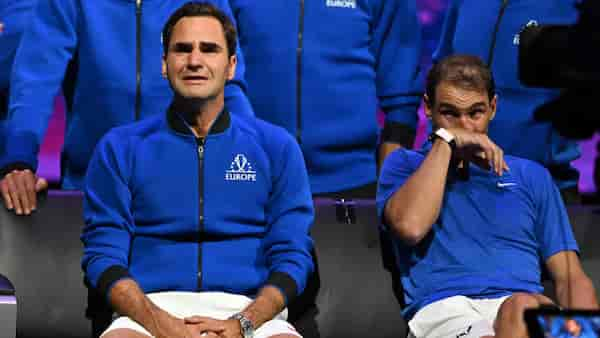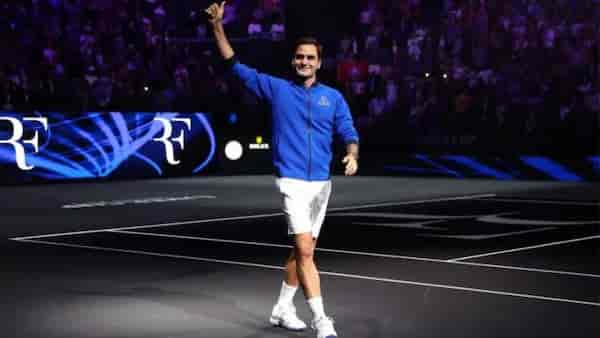Federer: Twelve Final Days — The Cinema & Immortality Of The Tennis Superstar
Federer: Twelve Final Days combines an insider’s eye with an outsider’s perspective. And, by extension, it becomes one that merges the grief of leaving with the acceptance of having left.

Promo poster for Federer: Twelve Final Days. Image via Amazon Prime Video
Last Updated: 03.37 PM, Jun 24, 2024
ONE of the two directors of Federer: Twelve Final Days is Asif Kapadia, the Oscar-winning documentary maker behind titles like Senna, Amy and Diego Maradona. Kapadia is a master of what I like to call “broad-daylight film-making”. His films aren’t investigative or existential, but they are curious about what already exists. They don’t subscribe to the luxury of capturing their ‘subjects’ in real-time. Instead, they find meaning in facts, art in compilation and truth in pre-recorded footage – they perceive the person through their legacy. In other words, Kapadia assembles an old story as if telling a new one. There was little we didn’t know in his portraits of F1 champion Aryton Senna, singer-songwriter Amy Winehouse and football icon Maradona. But sometimes, the construction of such lives is more illuminating than their deconstruction. Sometimes, we just need to experience the clarity of broad daylight.
At first, one might imagine that Federer: Twelve Final Days – a documentary about the time leading up to tennis superstar Roger Federer’s retirement in 2022 – is a new challenge for Kapadia. For starters, Federer is very much alive, even if his career is not. The void in the sport is still felt. The loss is still fresh. Federer is also not the sort of troubled genius that most non-fiction features thrive on exploring. He is the Patron Saint of modern sport: universally adored and idolised, incapable of controversy and complications. Almost everything about him – his game, family, support team, even his relationship with peers and players past – glistens with perfection. But his perfection isn’t boring. It’s the kind of perfection rooted in vulnerability and naturalism against all odds. Kapadia manages to reveal this, rather than depict it, in this documentary. And he does so by simulating the parameters – the intimacy of detachment – of his style.
For context, co-director Joe Sabia is the one who filmed these 12 days: the announcement in Switzerland, the behind-the-scenes reactions of family and friends, and the locker room camaraderie at the 2022 Laver Cup in London, Federer’s final professional tournament. Kapadia came in after everything was shot. So he is, again, the one who makes something out of the footage; the one who traces a picture like he’s drawing it from memory; the one who reframes editing as the language of creation. He finds the essence of Federer through the proximity of distance.

To draw a parallel, a film critic unburdened with pre-release interviews and all-star access tends to observe – and review – a film differently. That’s what Twelve Final Days is, a documentary that somehow combines an insider’s eye with an outsider’s perspective. And, by extension, it becomes one that merges the grief of leaving with the acceptance of having left. The Federer we know is dying but the Federer we don’t is letting go. It has the rhythm of a life flashing before our eyes. Only, we don’t know if it’s his or ours.
What we see, then, isn’t extraordinary or unprecedented. It’s more of a moving confrontation, a reckoning, especially for tennis fans who’ve already consumed those few weeks from cover to cover. One event becomes a prism that refracts light onto various pockets of his history. A couple of things acquire a deeper identity when placed in sequence. Like, for instance, Rafael Nadal’s significance to Federer, but also Federer’s enduring attachment to Nadal. It goes beyond the tears and memes. When the two played against each other, their rivalry felt more like a relationship with an exclusive membership of two. Every rally forced them to expand their capacities and become different, newer men.
The documentary plays up this bond by making us anticipate Nadal in a Federer narrative. Nadal doesn’t just arrive, he enters – it’s an introduction shot, late into the film, like the emergence of the elusive ‘mother’ in How I Met Your Mother. By then, we’ve seen the roles of everyone else: Djokovic, a bit of Murray, Mirka, the parents, the kids. It’s an impossibly romantic touch. It’s at this moment Federer looks a little more complete. Not much later, we see him looking for (his) Rafa during a photo shoot the way he looked for Mirka before tweeting his retirement letter.

There’s also the calming presence of Mirka, Federer’s wife and partner-in-rhyme. The sight of them together – effortlessly switching between Swiss German and English, listening and asking, remembering and caring – silently answers several questions about his temperament and technique over the years. Hearing her speak is so rare that it becomes an insight into the way Federer thinks, moves, emotes and recovers after defeats and victories alike. When she chokes up and confesses that, more than anything, she will miss watching him play, she is suddenly one of us while being a part of him. The professional and the personal effortlessly collide here. And it all makes sense: Federer’s love for tennis was always an expression of his companionship. He found great conflict on the court to offset his stability off it – crying and gliding and returning and losing with the kind of humanity that his game channelled so beautifully.
Most of all, Federer: Twelve Final Days allows itself to be what we need it to be. For some, it’s a warm dose of nostalgia. For some, it’s a reminder of the golden era of men’s tennis. But for some, it’s a reminder of themselves. For me, a long-time Federer believer, it felt like a personal message. At this precise moment in time, I think I needed to watch him – and my memories of him – face a future of uncertainty without forgetting to celebrate the certainty of his work. He doesn’t know what to expect or how to be, and yet, this looks like a superpower. It looks like courage masquerading as confusion. This is one of the greatest athletes of all time going with the flow of something he hasn’t practised for. And he’s generous enough to be lost around those who made and defined him. With most other legends, a farewell like this might have looked staged and a little arrogant. But with him, it radiates the innocence and sincerity of a children’s birthday party. The adults are all over the place, but there’s no place else they’d rather be.
Towards the end of the documentary, I realised why Roger Federer meant – and continues to mean – so much to me. It’s not simple fandom. Of course, there’s the grief of losing the ability to feel a certain way when he plays. I’ll miss the wreck I became during those missed break points and squandered match points. I’ll miss the suppressed passion and temper and joy his matches would yank out of me. I’ll miss the stranger – or the self – I became. But my association with Federer was never my own doing. In 2003, a new college friend winced when he heard that I was fascinated by this young American champion called Andy Roddick. He casually asked me to watch the guy who had just won his first Wimbledon title (“first” being the keyword – he already knew). I watched his guy play the US Open a month later and, to be honest, I wondered what the fuss was about. He made tennis look annoyingly versatile. It shouldn’t be that way, I argued. Champions are known for their strengths, their signature shots and styles, but this guy had none – or maybe he had them all.

But then I saw this friend watching Federer with a sense of wonder and awe. He never looked like that, and it immediately unlocked in me a desire to be a closer friend. I started following Federer with him so that we could discuss his matches before classes and have something in common. The harder I rooted for Federer – which, incidentally, wasn’t something I had to force – the stronger our friendship became. Federer’s highs and lows in the coming years even reflected the crests and troughs of our bond. When Federer lost that 2008 Wimbledon final, my friend was far away, studying in a different city. We had separate lives. When Federer finally won the French Open a year later, we had reconnected because of a family crisis I was going through. Federer’s struggle to win a Slam after 2012 coincided with my friend’s move to a new continent – adulthood had well and truly hit us all. Federer’s miraculous rise back to the top in 2017 and 2018 coincided with our globe-trotting travels together. After 30 years as individuals, we had just embraced a sense of plurality; we started seeing the world through each other’s eyes. The beginning of Federer’s end in 2020 brought not only the pandemic, but the diagnosis of leukemia. His aborted comebacks after that became synonymous with my friend’s chemotherapy cycles. Months after Federer’s retirement in 2022, he had his second relapse. He died in early 2023, nearly twenty years to the day I found Federer through him – and him through Federer.
In one of his final press conferences, the player reassures the media, but mainly himself, that “I won’t be a ghost”. He says this in context of former greats like Bjorn Borg, who disappeared from the limelight after retiring from the sport. Federer suggests, as his voice cracks, that he will be around in some way or the other. At this point, it felt like he was breaking the fourth wall and directing his words at me. It felt like my late friend was explaining, through a 41-year-old Federer, that he is more of a spirit than a ghost. His is more of an afterlife than a demise. Last year, I had convinced myself that both of them had abandoned me in sync; that one disappeared because the other did. But hearing Federer make a heartfelt promise – and stick to it since – reclaimed the visibility of that spirit. He is still around. He is still putting the ball back into my court. I now see at least twelve more years after twelve final days. I now see the silhouette of a friendship, not the imprint of a friend. All it took was some broad daylight.

 Premium
Premium